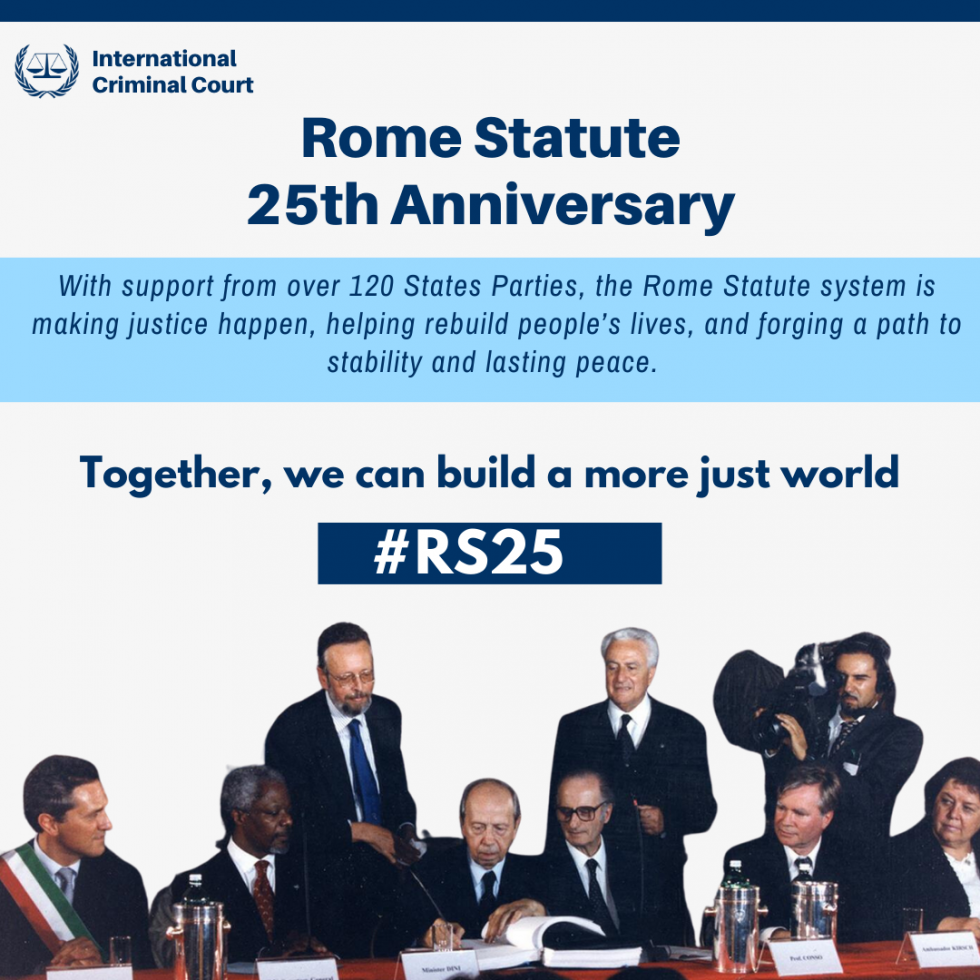International Criminal Justice Day and 25 years of Rome Statute

International Criminal Justice Day and 25 years of the Rome Statute | Author International Criminal Court
The idea of a permanent international criminal tribunal first emerged when the UN was established and continued to grow. Following the trials in Nuremberg and Tokyo and based on previous experience with ad hoc tribunals, for example the tribunals for Rwanda and the former Yugoslavia, the UN General Assembly, after years of preparatory work, decided to convene a diplomatic conference in Rome. The negotiations held from 15 to 17 July involved delegates from over 160 countries, representatives of the UN specialised agencies, programmes, and working bodies, as well as members of several international and civil society organisations.
The International Criminal Court investigates and prosecutes individuals for genocide, war crimes, crimes against humanity and the crime of aggression. It is complementary to national courts, which exercise primary criminal jurisdiction over international crimes. The Ljubljana-Hague Convention on international cooperation in the investigation and prosecution of international crimes, recently negotiated as part of the Mutual Legal Assistance and Extradition Initiative, will enable countries to prosecute these crimes more effectively. Since the International Criminal Court exercises complementary criminal jurisdiction, it can only intervene where states are unwilling or unable to do so. It determines individual criminal responsibility, i.e. the liability of natural persons. The States Parties to the Rome Statute have a duty to cooperate fully with the Court, as do all other UN member states in case of referral by the UN Security Council.
The International Criminal Court is composed of multiple organs: the Presidency, the Chambers (consisting of the 18 judges), the Office of the Prosecutor, and the Registry. The Court is governed by the Assembly of States Parties with a representative body, the Bureau, to assist the Assembly in discharging its responsibilities.
The Rome Statute grants important rights to victims of atrocities, which often affect numerous people. They may participate in proceedings before the Court from the very first stage and may be awarded reparations. The Court runs a Trust Fund for Victims, financed through voluntary contributions to provide support for victims and their families.
The Rome Statute has seen various amendments expanding the definition of war crimes and crimes against humanity (for example to include the use of certain weapons, starvation and incrimination in non-international armed conflicts). In 2010, the review conference in Kampala led to the adoption of amendments granting the International Criminal Court jurisdiction over crimes of aggression. Today marks the 5th anniversary since the Kampala amendments were activated (2018).
Slovenia actively participated in negotiations in Rome and Kampala, and is a State Party to the Rome Statute. It has ratified all amendments to the Statute and is a regular contributor to the Trust Fund for Victims. So far, Slovenia has been elected member of the Bureau three times and has this year also nominated a candidate for the judicial elections.
The Rome Statute entered into force on 1 July 2002, establishing the International Criminal Court. Of the 137 signatories, 123 states have ratified or acceded to the Rome Statute as States Parties.

